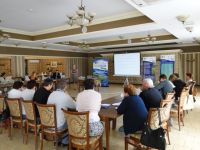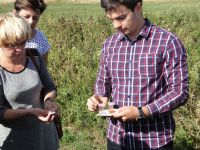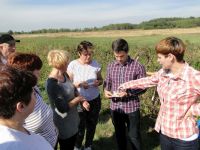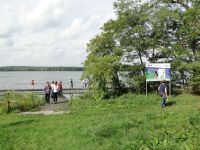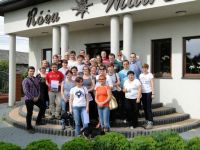



Specialist Training for Employees of the Silesia Agricultural Consultation Centre entitled ‘Buffer Zones and Other Measures for Reducing Diffuse Pollution from Agricultural Areas’
On 15-16 September 2015, in Zawada Pilicka, a 2-day specialist training entitled ‘Buffer Zones and Other Measures for Reducing Diffuse Pollution from Agricultural Areas’ was held for employees of the Silesia Agricultural Consultation Centre.
During the training, its participants could learn about the key assumptions and achievements of LIFE+ EKOROB Project. Mr. Wojciech Frątczak, Project Coordinator (Regional Water Management Board in Warsaw), presented SWAT modelling results to demonstrate spatial differences of emissions of diffuse pollution of agricultural and municipal origin in the Pilica catchment. An analysis of efficiency of buffer vegetation zone in the agricultural landscape and of highly efficient ecotones constructed under the project in the Sulejow Reservoir shoreline was a subject of the next lecture delivered by Ms. Katarzyna Izydorczyk (ERCE PAS). Ms. Agnieszka Bednarek (Department of Applied Ecology, UL) presented issues of using denitrification deposits as an efficient method to reduce nitrate pollution, which raised a great interest of the training participants. During the next part of the training, representatives of the Agency for Restructuring and Modernisation of Agriculture in Czestochowa, i.e. Ms. Joanna Trejtowicz and Mr. Janusz Podpłomyk representing the On-spot Inspection Office, delivered a speech on agricultural-environmental-climatic and ecological payments under the Rural Areas Development Programme 2014-2020 in 2015, on mutual compliance inspections as well as inspections in Vulnerable Zones, as instruments that can reduce nitrogen discharge from agricultural sources. That presentation initiated discussions and exchange of opinions and experience in terms of options that can influence decisions taken by farmers.
During the afternoon session, EKOROB Project representatives presented the Action Programme developed under LIFE+ EKOROB Project, which aims at reducing diffuse pollution from the Pilica catchment. Comments submitted by the consultants in terms of solutions and requests in relation to the Action Programme were of a special importance to the Project representatives to increase the realistic dimension and effectiveness of the proposed actions.
On the second day of the training, the participants took part in a visit to buffer zones constructed in demosites in Barkowice Zatoka and Barkowice Łaka, and naturally formed zones in Radonka, a monitoring demosite. Sample collection and work in the field were presented, and the participants also saw effectiveness of the applied solutions, i.e. of a denitrification wall, a biogeochemical barrier and vegetation zones. They also visited a monitoring site of the project, where they could measure effectiveness of a buffer zone, i.e. a meadow which is extensively used to treat underground water from nitrates incoming from arable land.
We would like to thank the participants for their active involvement and valuable comments which allow us to assess the already proposed solutions. Apart from thanking the training participants - the SCAC personnel - and the speakers, i.e. Ms. Joanna Trejtowicz and Mr. Janusz Podpłomyk representing the On-spot Inspection Office of the Regional Branch of the Agency for Restructuring and Modernisation of Agriculture in Czestochowa, we would also like to express our gratitude to the following persons for their support in organisation of this training: Mr. Grzegorz Boski, Director of the Silesia Agricultural Consultation Centre in Czestochowa, Ms. Teresa Giel of Mikołow branch of the Polish Allotments Owners’ Association – Silesia Agricultural Consultation Centre, Mr. Stanisław Gmitruk, Director of Silesia Branch of the Agency for Restructuring and Modernisation of Agriculture in Czestochowa, and Managers: Ms. Mirosława Duda, and Mr. Leonard Smolarski and Artur Chyra of Silesia Branch of the Agency for Restructuring and Modernisation of Agriculture in Czestochowa.
We hope that the knowledge transferred to employees of the Silesia Agricultural Consultation Centre will be useful in terms of their cooperation with farmers, and create an opportunity to transfer innovative and effective solutions to reduce diffuse pollution.



